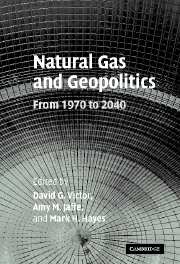Book contents
- Frontmatter
- Contents
- List of figures
- List of tables
- List of boxes
- List of contributors
- Foreword by James A. Baker, III
- Acknowledgments
- List of acronyms and abbreviations
- Part I Introduction and context
- Part II Historical case studies
- Part III International gas trade economics
- Part IV Implications
- 14 Conclusions
- Appendix: Technical notes
- Index
- References
14 - Conclusions
Published online by Cambridge University Press: 22 September 2009
- Frontmatter
- Contents
- List of figures
- List of tables
- List of boxes
- List of contributors
- Foreword by James A. Baker, III
- Acknowledgments
- List of acronyms and abbreviations
- Part I Introduction and context
- Part II Historical case studies
- Part III International gas trade economics
- Part IV Implications
- 14 Conclusions
- Appendix: Technical notes
- Index
- References
Summary
Natural gas is rapidly gaining in geopolitical importance. Over the last hundred years, gas has grown from a marginal fuel consumed for specialized purposes in regionally disconnected markets to a commodity that is transported globally and used in many different economic sectors. In the last forty years, especially, natural gas has become a fuel of choice for consumers seeking its relatively low environmental impact, especially for electric power-generation. Over the next thirty years, world demand for gas is expected to double, surpassing coal as the world's number two energy source and potentially overtaking oil's share in many large industrialized economies.
The vision for a world shifting to gas is not constrained by the physical abundance of the resource. The world's known (“proved”) gas reserves are sufficient for nearly seventy years of production at today's levels; the total base of potential conventional gas resources is estimated to be at least twice as large. Like oil, however, the richest gas deposits are far from the areas where demand for gas is expected to rise most rapidly. About three-quarters of the world's proven gas reserves are located in the Former Soviet Union (FSU) and the Middle East.
The integration of gas markets is the by-product of a steady and cumulative improvement in technologies for long-distance transportation of gas – pipelines and LNG. Regional and local gas trading networks are based on pipeline interconnections, and very-long-distance transportation is increasingly the province of LNG. International trade in LNG has been occurring for over forty years and involves shipments from close to a dozen countries.
- Type
- Chapter
- Information
- Natural Gas and GeopoliticsFrom 1970 to 2040, pp. 467 - 483Publisher: Cambridge University PressPrint publication year: 2006
References
- 3
- Cited by



